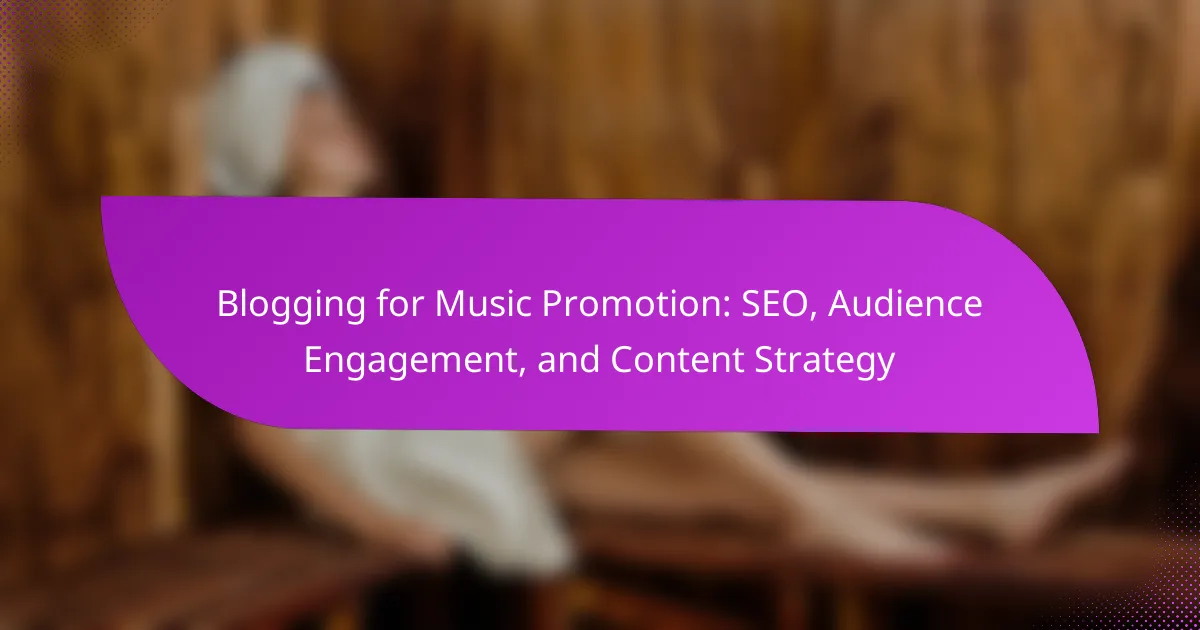Blogging is a powerful tool for music promotion, enabling artists to boost their visibility and connect with fans on a deeper level. By implementing effective SEO strategies and creating engaging content, musicians can drive traffic to their music platforms while building a loyal community around their brand.
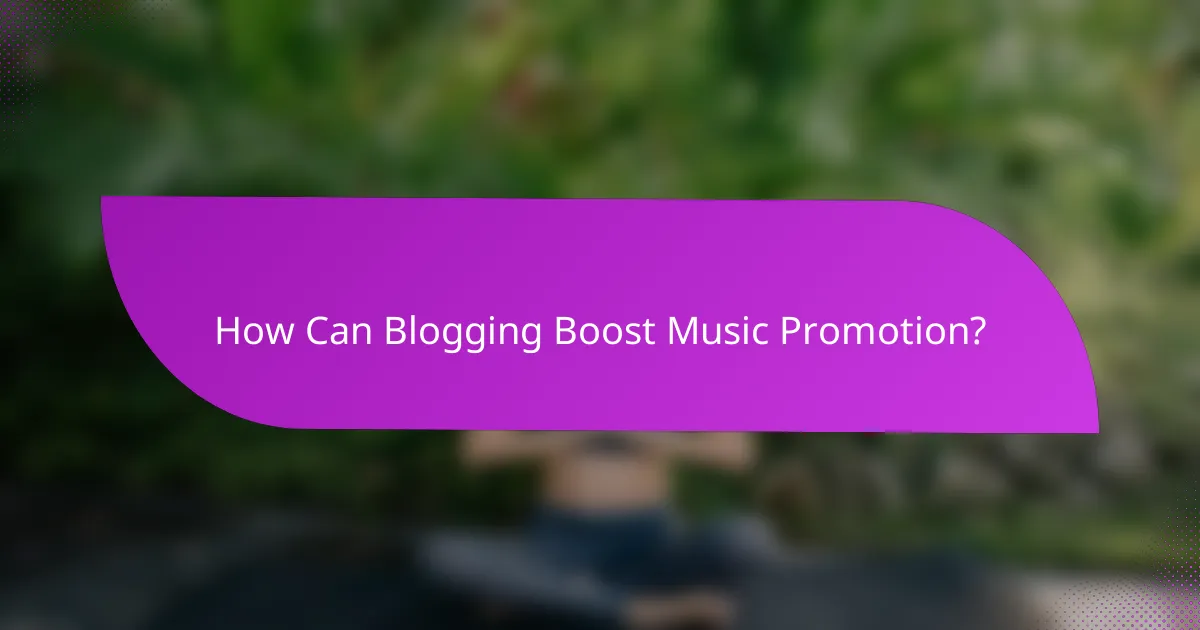
How Can Blogging Boost Music Promotion?
Blogging can significantly enhance music promotion by increasing visibility, engaging fans, and building a personal brand. Through consistent and strategic content creation, artists can connect with their audience and drive traffic to their music platforms.
Increased visibility through SEO
Search Engine Optimization (SEO) is crucial for boosting the visibility of music blogs. By using relevant keywords related to your music genre, you can improve your chances of appearing in search results, making it easier for potential fans to discover your work.
Focus on optimizing your blog posts with titles, meta descriptions, and alt tags that include these keywords. Regularly updating your blog with fresh content can also help maintain or improve your search rankings.
Engagement with fans via content
Engaging content fosters a strong connection with fans. This can include behind-the-scenes stories, updates on new releases, or insights into your creative process. By sharing personal experiences, you invite fans into your world, making them feel more invested in your music.
Consider using interactive elements like polls or Q&A sessions to encourage fan participation. This not only boosts engagement but also provides valuable feedback on what your audience enjoys.
Building a personal brand
Blogging helps artists establish a unique personal brand that resonates with their audience. Consistent themes, visuals, and writing styles can create a recognizable identity that sets you apart from other musicians.
Utilize your blog to showcase your values, influences, and artistic vision. This authenticity can attract fans who share similar interests and create a loyal following.
Driving traffic to music platforms
Effective blogging can drive traffic to your music platforms, such as Spotify or Bandcamp. Include links to your music in blog posts, encouraging readers to listen and share your tracks.
Consider writing posts that highlight specific songs or albums, providing context and inviting readers to explore your music further. This strategy can lead to increased streams and downloads.
Creating shareable content
Creating shareable content is essential for expanding your reach. Posts that resonate with readers, such as lists, tutorials, or personal anecdotes, are more likely to be shared on social media platforms.
Incorporate visuals, such as images or videos, to enhance your content’s appeal. Engaging graphics or compelling stories can encourage fans to share your posts, amplifying your promotional efforts.
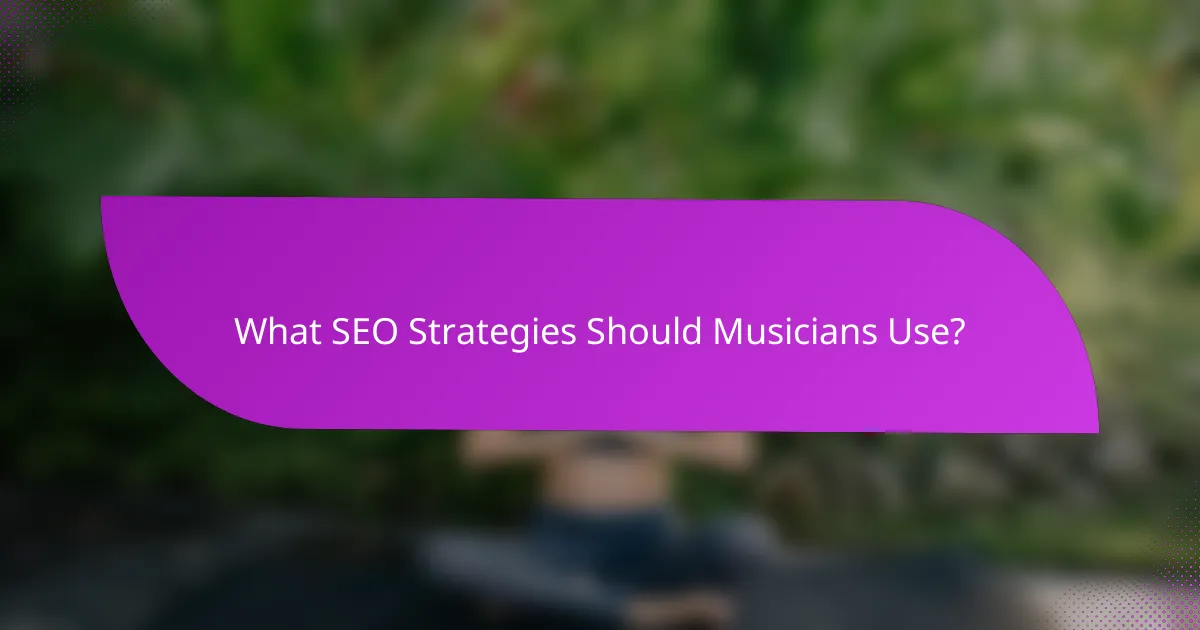
What SEO Strategies Should Musicians Use?
Musicians can enhance their online presence and reach by implementing effective SEO strategies tailored to their audience. Key approaches include keyword research, optimizing blog content, utilizing meta tags, and building backlinks from relevant music sites.
Keyword research for music niches
Keyword research is essential for identifying the terms and phrases your target audience uses when searching for music-related content. Tools like Google Keyword Planner and SEMrush can help you discover keywords with good search volume and low competition.
Focus on long-tail keywords that reflect specific genres, themes, or locations. For instance, instead of just “rock music,” consider “indie rock bands in London.” This specificity can help attract a more engaged audience.
Optimizing blog posts for search engines
To optimize blog posts, ensure that your primary keyword appears in the title, headings, and throughout the content naturally. Aim for a keyword density of around 1-2% to avoid keyword stuffing while still signaling relevance to search engines.
Additionally, use engaging visuals and multimedia elements, such as embedded music tracks or videos, to enhance user experience and keep visitors on your page longer, which can positively impact your SEO ranking.
Using meta tags effectively
Meta tags, including title tags and meta descriptions, play a crucial role in how search engines understand your content. Craft compelling title tags that include your primary keyword and keep them under 60 characters for optimal display in search results.
For meta descriptions, summarize your blog post in 150-160 characters, incorporating relevant keywords to entice clicks. A well-written meta description can significantly improve your click-through rate.
Building backlinks from music sites
Building backlinks from reputable music sites can enhance your blog’s authority and improve its search engine ranking. Reach out to music bloggers, collaborate on guest posts, or participate in music forums to create valuable connections.
Consider creating shareable content, such as infographics or unique music insights, that others in the music community would want to link to. This approach not only boosts your SEO but also fosters relationships within the industry.
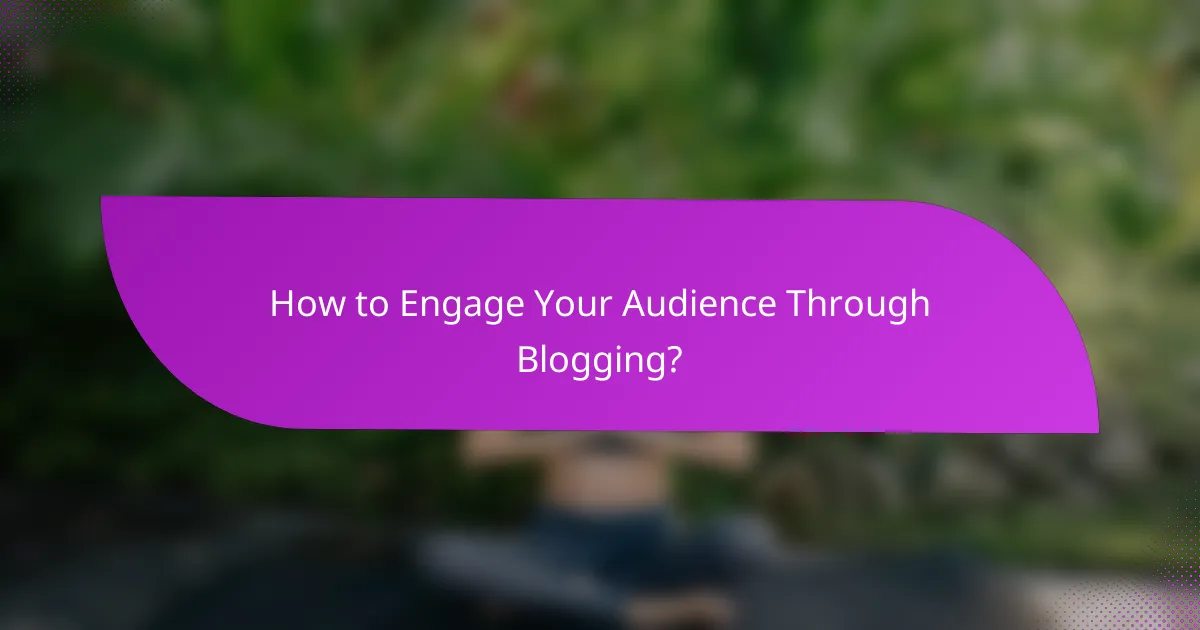
How to Engage Your Audience Through Blogging?
Engaging your audience through blogging involves creating content that resonates with them, encourages interaction, and utilizes various platforms for promotion. By focusing on relatable topics and effective storytelling, you can foster a loyal community around your music.
Creating relatable content
Relatable content connects with your audience’s experiences and emotions. Consider writing about your personal journey in music, the challenges you face, or the inspirations behind your songs. This authenticity helps build trust and encourages readers to engage with your work.
Use language and references that your audience understands. For example, if your music targets young adults, discuss themes relevant to their lives, such as relationships or career struggles. This approach makes your blog posts more appealing and shareable.
Utilizing storytelling techniques
Storytelling can transform a simple blog post into an engaging narrative. Start with a hook that captures attention, then develop a storyline that includes conflict and resolution. For instance, share a story about a memorable performance or a lesson learned during your music career.
Incorporate descriptive details to paint a vivid picture, allowing readers to visualize your experiences. This technique not only entertains but also deepens the emotional connection between you and your audience.
Encouraging audience interaction
Encouraging interaction is key to building a community around your blog. Ask open-ended questions at the end of your posts to invite comments and discussions. For example, inquire about your readers’ favorite songs or their thoughts on a recent trend in music.
Consider hosting polls or contests related to your music. This not only engages your audience but also provides valuable feedback and insights into their preferences, helping you tailor future content.
Leveraging social media for promotion
Social media is a powerful tool for promoting your blog and engaging with your audience. Share snippets of your blog posts on platforms like Instagram, Facebook, and Twitter to drive traffic back to your site. Use eye-catching visuals and compelling captions to attract attention.
Engage with your followers by responding to comments and sharing user-generated content. This two-way interaction fosters a sense of community and encourages more people to visit your blog, ultimately enhancing your music promotion efforts.
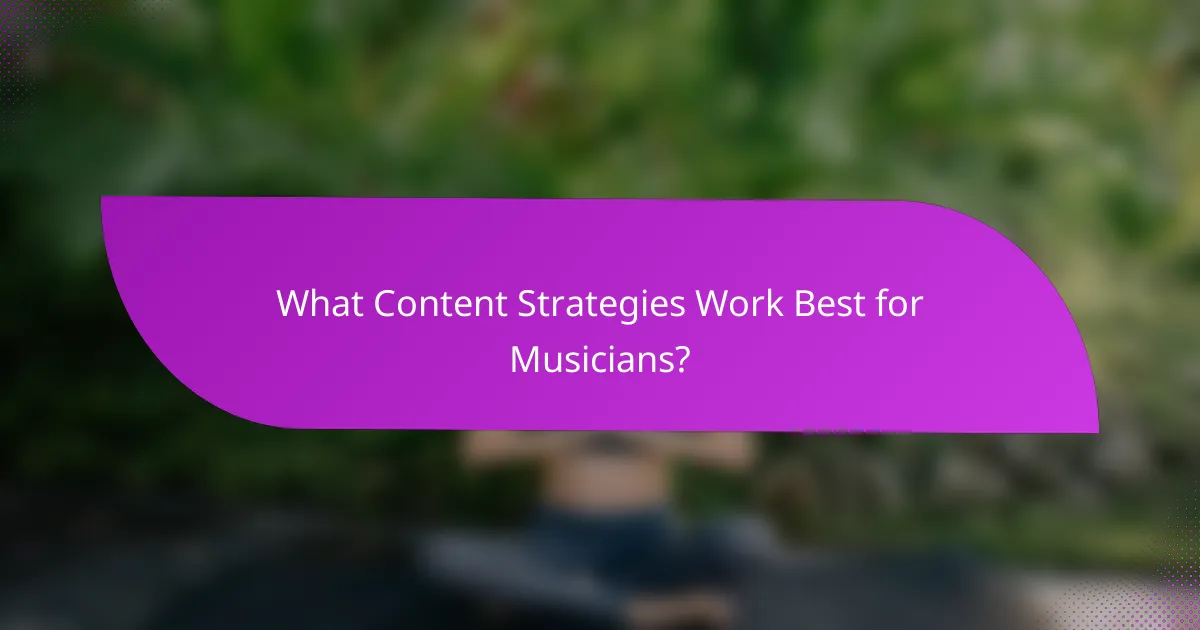
What Content Strategies Work Best for Musicians?
Effective content strategies for musicians focus on consistency, variety, and collaboration to engage audiences and promote their music. By implementing a regular posting schedule, utilizing diverse content formats, collaborating with other artists, and leveraging analytics, musicians can enhance their visibility and connect with fans more effectively.
Regular posting schedule
Establishing a regular posting schedule is crucial for maintaining audience interest and engagement. Aim for a consistent frequency, such as weekly or bi-weekly updates, to keep your fans informed and excited about your music. This could include new song releases, behind-the-scenes content, or updates on upcoming performances.
Consider using a content calendar to plan and organize your posts. This helps ensure that you cover a range of topics and avoid long gaps between updates. Regularity builds anticipation and can significantly boost your online presence.
Diverse content formats
Utilizing diverse content formats can cater to different audience preferences and enhance engagement. Musicians can create a mix of videos, blog posts, podcasts, and social media updates to showcase their work and personality. For example, behind-the-scenes videos can offer fans a glimpse into the creative process, while blog posts can provide deeper insights into song meanings.
Experimenting with formats such as live streams or interactive Q&A sessions can also foster a stronger connection with your audience. This variety keeps your content fresh and encourages followers to engage with your brand on multiple platforms.
Collaborations with other artists
Collaborating with other artists can expand your reach and introduce your music to new audiences. Partnering on songs, co-hosting events, or featuring each other in social media content can create a mutually beneficial relationship. These collaborations can also enhance creativity and lead to unique musical projects.
When seeking collaborations, consider artists within your genre or those who share a similar fan base. This strategic approach can lead to more effective promotions and a stronger community around your music.
Using analytics to refine strategy
Leveraging analytics is essential for refining your content strategy. Platforms like Google Analytics and social media insights can provide valuable data on audience behavior, engagement rates, and content performance. By analyzing this information, you can identify which types of content resonate most with your audience.
Regularly review your analytics to adjust your posting schedule, content formats, and promotional strategies. This data-driven approach allows you to focus on what works best, ultimately leading to more effective music promotion and audience growth.
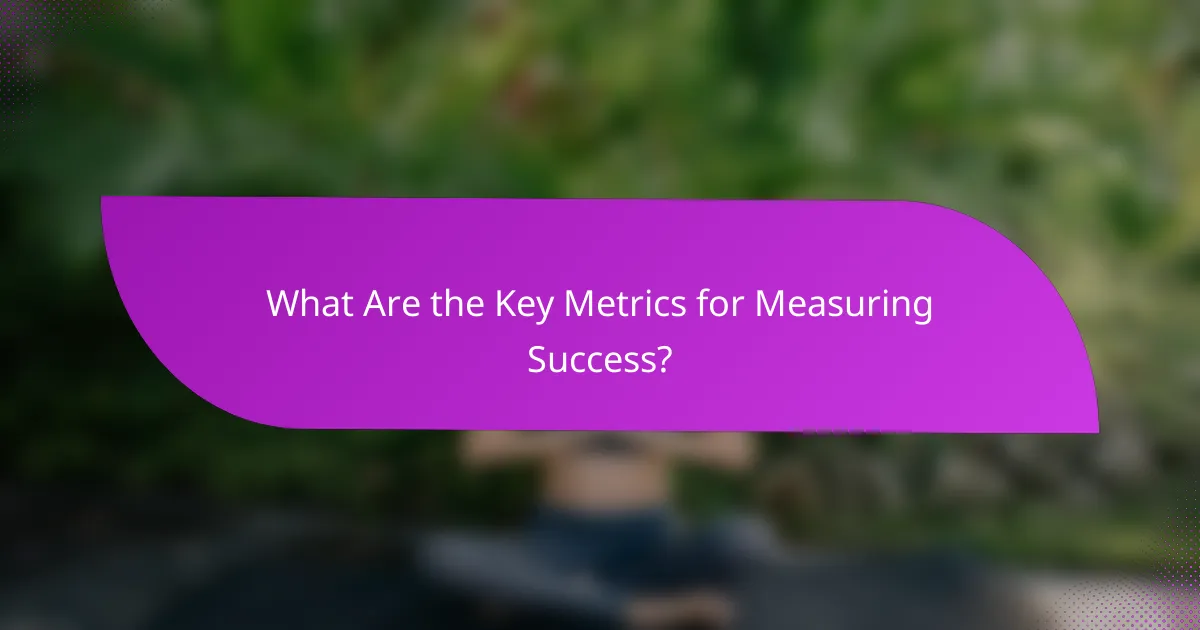
What Are the Key Metrics for Measuring Success?
Key metrics for measuring success in music blogging include website traffic, engagement rates, and conversion metrics. These indicators help assess how well your content resonates with your audience and its effectiveness in promoting your music.
Website traffic analysis
Website traffic analysis involves tracking the number of visitors to your blog and understanding their behavior. Key metrics include unique visitors, page views, and average session duration. Tools like Google Analytics can provide insights into which posts attract the most traffic and how users navigate your site.
To improve your traffic, focus on optimizing your blog for search engines through SEO best practices. This includes using relevant keywords, creating quality content, and ensuring your site is mobile-friendly. Aim for a steady increase in traffic over time, ideally in the range of 10-20% monthly growth.
Engagement rates on posts
Engagement rates measure how actively your audience interacts with your content. This includes metrics such as comments, shares, likes, and time spent on each post. High engagement indicates that your audience finds your content valuable and relevant.
To boost engagement, encourage readers to comment by asking questions or prompting discussions at the end of your posts. Monitor which types of content generate the most interaction and adjust your strategy accordingly. Aiming for engagement rates of 2-5% is a good benchmark for blog posts in the music niche.
